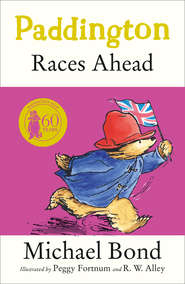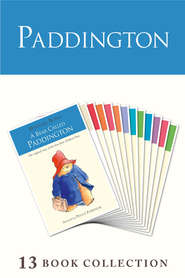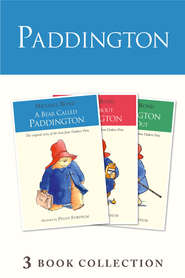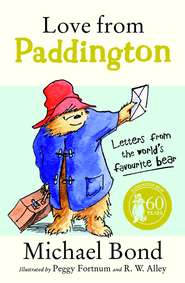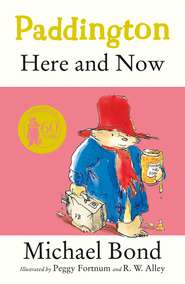По всем вопросам обращайтесь на: info@litportal.ru
(©) 2003-2024.
✖
A Bear Called Paddington
Настройки чтения
Размер шрифта
Высота строк
Поля
MR AND MRS Brown first met Paddington on a railway platform. In fact, that was how he came to have such an unusual name for a bear, for Paddington was the name of the station.
The Browns were there to meet their daughter Judy, who was coming home from school for the holidays. It was a warm summer day and the station was crowded with people on their way to the seaside. Trains were humming, loudspeakers blaring, porters rushing about shouting at one another, and altogether there was so much noise that Mr Brown, who saw him first, had to tell his wife several times before she understood.
âA bear? On Paddington station?â Mrs Brown looked at her husband in amazement. âDonât be silly, Henry. There canât be!â
Mr Brown adjusted his glasses. âBut there is,â he insisted. âI distinctly saw it. Over there â near the bicycle rack. It was wearing a funny kind of hat.â
Without waiting for a reply he caught hold of his wifeâs arm and pushed her through the crowd, round a trolley laden with chocolate and cups of tea, past a bookstall, and through a gap in a pile of suitcases towards the Lost Property Office.
âThere you are,â he announced triumphantly, pointing towards a dark corner, âI told you so!â
Mrs Brown followed the direction of his arm and dimly made out a small, furry object in the shadows. It seemed to be sitting on some kind of suitcase and around its neck there was a label with some writing on it. The suitcase was old and battered and on the side, in large letters, were the words WANTED ON VOYAGE.
Mrs Brown clutched at her husband. âWhy, Henry,â she exclaimed. âI believe you were right after all. It is a bear!â
She peered at it more closely. It seemed a very unusual kind of bear. It was brown in colour, a rather dirty brown, and it was wearing a most odd-looking hat, with a wide brim, just as Mr Brown had said. From beneath the brim two large, round eyes stared back at her.
Seeing that something was expected of it the bear stood up and politely raised its hat, revealing two black ears. âGood afternoon,â it said, in a small, clear voice.
âEr⦠good afternoon,â replied Mr Brown, doubtfully. There was a moment of silence.
The bear looked at them inquiringly. âCan I help you?â
Mr Brown looked rather embarrassed. âWell⦠no. Er⦠as a matter of fact, we were wondering if we could help you.â
Mrs Brown bent down. âYouâre a very small bear,â she said.
The bear puffed out its chest. âIâm a very rare sort of bear,â he replied importantly. âThere arenât many of us left where I come from.â
âAnd where is that?â asked Mrs Brown.
The bear looked round carefully before replying. âDarkest Peru. Iâm not really supposed to be here at all. Iâm a stowaway!â
âA stowaway?â Mr Brown lowered his voice and looked anxiously over his shoulder. He almost expected to see a policeman standing behind him with a notebook and pencil, taking everything down.
âYes,â said the bear. âI emigrated, you know.â A sad expression came into its eyes. âI used to live with my Aunt Lucy in Peru, but she had to go into a home for retired bears.â
âYou donât mean to say youâve come all the way from South America by yourself?â exclaimed Mrs Brown.
The bear nodded. âAunt Lucy always said she wanted me to emigrate when I was old enough. Thatâs why she taught me to speak English.â
âBut whatever did you do for food?â asked Mr Brown. âYou must be starving.â
Bending down, the bear unlocked the suitcase with a small key, which it also had round its neck, and brought out an almost empty glass jar. âI ate marmalade,â he said, rather proudly. âBears like marmalade. And I lived in a lifeboat.â
âBut what are you going to do now?â said Mr Brown. âYou canât just sit on Paddington station waiting for something to happen.â
âOh, I shall be all right⦠I expect.â The bear bent down to do up its case again. As he did so Mrs Brown caught a glimpse of the writing on the label. It said, simply, PLEASE LOOK AFTER THIS BEAR. THANK YOU.
She turned appealingly to her husband. âOh, Henry, what shall we do? We canât just leave him here. Thereâs no knowing what might happen to him. Londonâs such a big place when youâve nowhere to go. Canât he come and stay with us for a few days?â
Mr Brown hesitated. âBut Mary, dear, we canât take him⦠not just like that. After allâ¦â
âAfter all, what?â Mrs Brownâs voice had a firm note to it. She looked down at the bear. âHe is rather sweet. And heâd be such company for Jonathan and Judy. Even if itâs only for a little while. Theyâd never forgive us if they knew youâd left him here.â
âIt all seems highly irregular,â said Mr Brown, doubtfully. âIâm sure thereâs a law about it.â He bent down. âWould you like to come and stay with us?â he asked. âThat is,â he added, hastily, not wishing to offend the bear, âif youâve nothing else planned.â
The bear jumped and his hat nearly fell off with excitement. âOooh, yes, please. I should like that very much. Iâve nowhere to go and everyone seems in such a hurry.â
âWell, thatâs settled then,â said Mrs Brown, before her husband could change his mind. âAnd you can have marmalade for breakfast every morning, and â â she tried hard to think of something else that bears might like.
âEvery morning?â The bear looked as if it could hardly believe its ears. âI only had it on special occasions at home. Marmaladeâs very expensive in Darkest Peru.â
âThen you shall have it every morning starting tomorrow,â continued Mrs Brown. âAnd honey on Sunday.â
A worried expression came over the bearâs face. âWill it cost very much?â he asked. âYou see, I havenât very much money.â
âOf course not. We wouldnât dream of charging you anything. We shall expect you to be one of the family, shanât we, Henry?â Mrs Brown looked at her husband for support.
âOf course,â said Mr Brown. âBy the way,â he added, âif you are coming home with us youâd better know our names. This is Mrs Brown and Iâm Mr Brown.â
The bear raised its hat politely â twice. âI havenât really got a name,â he said. âOnly a Peruvian one which no one can understand.â
âThen weâd better give you an English one,â said Mrs Brown. âItâll make things much easier.â She looked round the station for inspiration. âIt ought to be something special,â she said thoughtfully. As she spoke an engine standing in one of the platforms gave a loud wail and a train began to move. âI know what!â she exclaimed. âWe found you on Paddington station so weâll call you Paddington!â
âPaddington!â The bear repeated it several times to make sure. âIt seems a very long name.â
âQuite distinguished,â said Mr Brown. âYes, I like Paddington as a name. Paddington it shall be.â
Mrs Brown stood up. âGood. Now, Paddington, I have to meet our little daughter, Judy, off the train. Sheâs coming home from school. Iâm sure you must be thirsty after your long journey, so you go along to the buffet with Mr Brown and heâll buy you a nice cup of tea.â
Paddington licked his lips. âIâm very thirsty,â he said. âSea water makes you thirsty.â He picked up his suitcase, pulled his hat down firmly over his head, and waved a paw politely in the direction of the buffet. âAfter you, Mr Brown.â
âEr⦠thank you, Paddington,â said Mr Brown.
âNow, Henry, look after him,â Mrs Brown called after them. âAnd for goodnessâ sake, when you get a moment, take that label off his neck. It makes him look like a parcel. Iâm sure heâll get put in a luggage van or something if a porter sees him.â
The buffet was crowded when they entered but Mr Brown managed to find a table for two in a corner. By standing on a chair Paddington could just rest his paws comfortably on the glass top. He looked around with interest while Mr Brown went to fetch the tea. The sight of everyone eating reminded him of how hungry he felt. There was a half-eaten bun on the table but just as he reached out his paw a waitress came up and swept it into a pan.
âYou donât want that, dearie,â she said, giving him a friendly pat. âYou donât know where itâs been.â
Paddington felt so empty he didnât really mind where it had been but he was much too polite to say anything.
âWell, Paddington,â said Mr Brown, as he placed two steaming cups of tea on the table and a plate piled high with cakes. âHowâs that to be going on with?â
Paddingtonâs eyes glistened. âItâs very nice, thank you,â he exclaimed, eyeing the tea doubtfully. âBut itâs rather hard drinking out of a cup. I usually get my head stuck, or else my hat falls in and makes it taste nasty.â
Mr Brown hesitated. âThen youâd better give your hat to me. Iâll pour the tea into a saucer for you. Itâs not really done in the best circles, but Iâm sure no one will mind just this once.â






